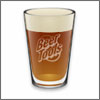Beerthoven
Well-Known Member
What is the minimum amount of water per pound of grain to use for effective batch sparging? I'm thinking about 1 quart per pound or so?
I'm trying to figure out how much sparge water I need to use for a barley wine. I'll be draining the tun of first runnings then doing two batch sparges.
I'm trying to figure out how much sparge water I need to use for a barley wine. I'll be draining the tun of first runnings then doing two batch sparges.



